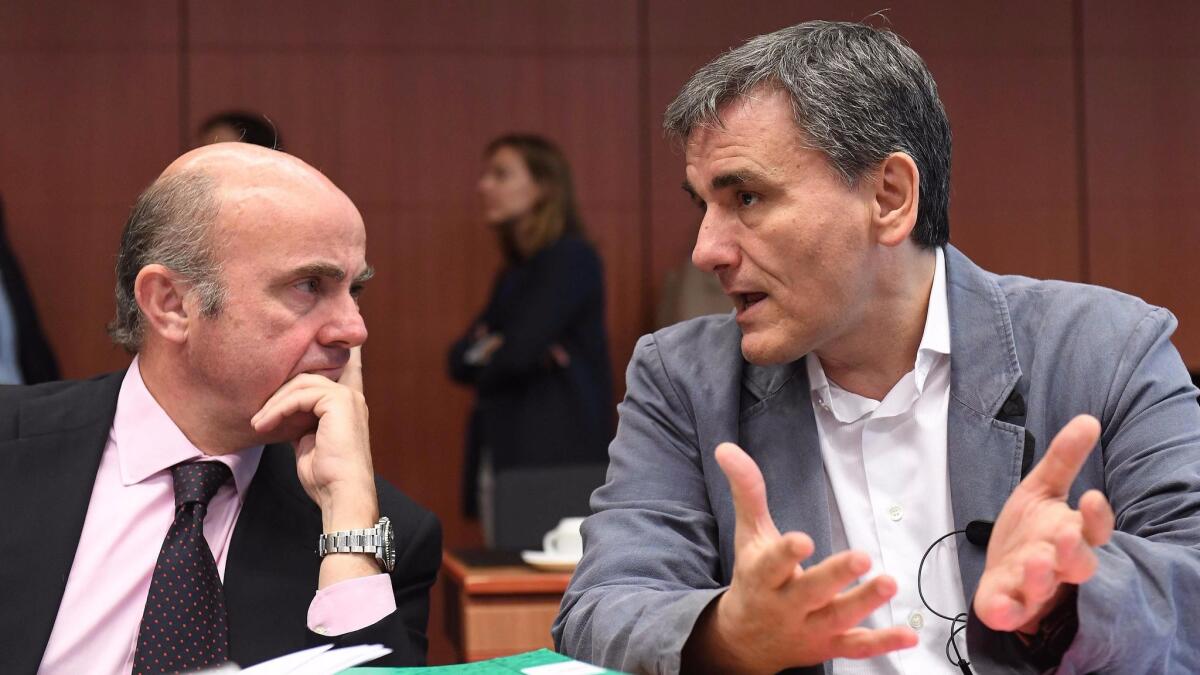Once again, Greece has Europe’s finance ministers tied in knots

Greece will receive billions of euros to repay the institutions it has borrowed money from in time for a crucial July deadline, avoiding another situation that could plunge the country into crisis — as when it nearly defaulted on its loans in 2015.
But the country will have to wait until next month to receive the funds. European finance ministers will gather again then to formally sign off on the payout after failing Monday to agree with lenders on a broader bailout deal for Greece, which has run up the equivalent of an estimated $350 billion in debt.
Lender institutions and finance ministers from the 19 Eurozone countries agreed to help Greece pay back nearly $8 billion it is required to by July. But that was the easy part of their discussions.
“We are very close to that agreement, but tonight we’re unable to close a possible gap between what could be done and what some of us had expected should be done,” said Jeroen Dijsselbloem, president of the Eurogroup, which represents finance ministers from the countries that use the euro.
He said the ministers needed to consider “additional options or adjusting our expectations.”
The group of ministers and representatives from the four lender institutions — the European Commission, the European Union’s executive arm; the European Central Bank; the International Monetary Fund; and the European Stability Mechanism — met in Brussels for almost eight hours Monday and walked out close to midnight with few results to show. They delayed a deal over longer-term debt relief measures for Greece until their next meeting on June 15.
It should not be beyond the wit of man to find that compromise within three weeks.
— Greek Finance Minister Euclid Tsakalotos
The group has gone through numerous late-night meetings over Greece, whose debt crisis spiraled into three bailouts from the international lenders in 2010, 2012 and a last, three-year program worth $95 billion in 2015.
“I’m sure the efforts we put in are not going to be in vain. They’re a very good basis for our next meeting,” said Pierre Moscovici, the European Commission’s finance chief.
Greek Finance Minister Euclid Tsakalotos was similarly optimistic, telling reporters as he left the meeting, “It should not be beyond the wit of man to find that compromise within three weeks.”
Talks were weighed down by the International Monetary Fund’s repeated strict warnings that Greece’s debt is unsustainable. The fund left the current bailout program in 2015, contending that the country’s economy could not handle the cost of the debt.
Germany has pushed to bring the IMF back to the group of lenders as a kind of guarantee that the deal will work, and refused to agree to a new bailout loan until the fund joins. Especially now, ahead of German elections in September, the country’s leaders are wary of approving a bailout deal that voters could perceive as too risky. Germany’s Parliament must approve any bailout deal before it can go ahead.
Djisselbloem told reporters that the fund will become part of the bailout program again before the start of the summer, opening a path for Germany to potentially agree to a deal.
Monday’s talks came four days after Greece’s Parliament passed a major austerity bill designed to save $4.5 billion in the next three years through pension cuts and tax increases. Greek leaders wanted the measures to persuade their lenders to agree to a bailout.
“We deserve and we expect from Monday’s Eurogroup a decision regulating debt relief which will correspond to the sacrifices of the Greek people,” Greek Prime Minister Alexis Tsipras said on Thursday, the day of the Parliament’s vote.
German Finance Minister Wolfgang Schaeuble told reporters before the meeting that Greece’s new law is a “good step”.
“I hope we can come to a solution today,” he said.
Schaeuble, a member of Chancellor Angela Merkel’s conservative Christian Democratic Union party, has recently clashed with politicians from Germany’s Social Democratic Party over his refusal to sign off on more payments to Greece without the IMF.
Sigmar Gabriel, Germany’s Social Democrat vice chancellor, told the daily newspaper Sueddeutsche Zeitung Monday that Germany should agree to a bailout deal.
“Greece has always been promised debt relief when its reforms are implemented,” he said. A bailout should not “fail because of German resistance.”
The European Commission said in its newest economic forecast for its 28 member states, which was published last week, that delays in reaching a deal on Greece’s bailout were only hurting the country’s economy more and detracting investors.
ALSO
Turkey says U.S. was ‘aggressive’ toward bodyguards briefly detained in protesters’ beating
Stupp is a special correspondent.
More to Read
Sign up for Essential California
The most important California stories and recommendations in your inbox every morning.
You may occasionally receive promotional content from the Los Angeles Times.










